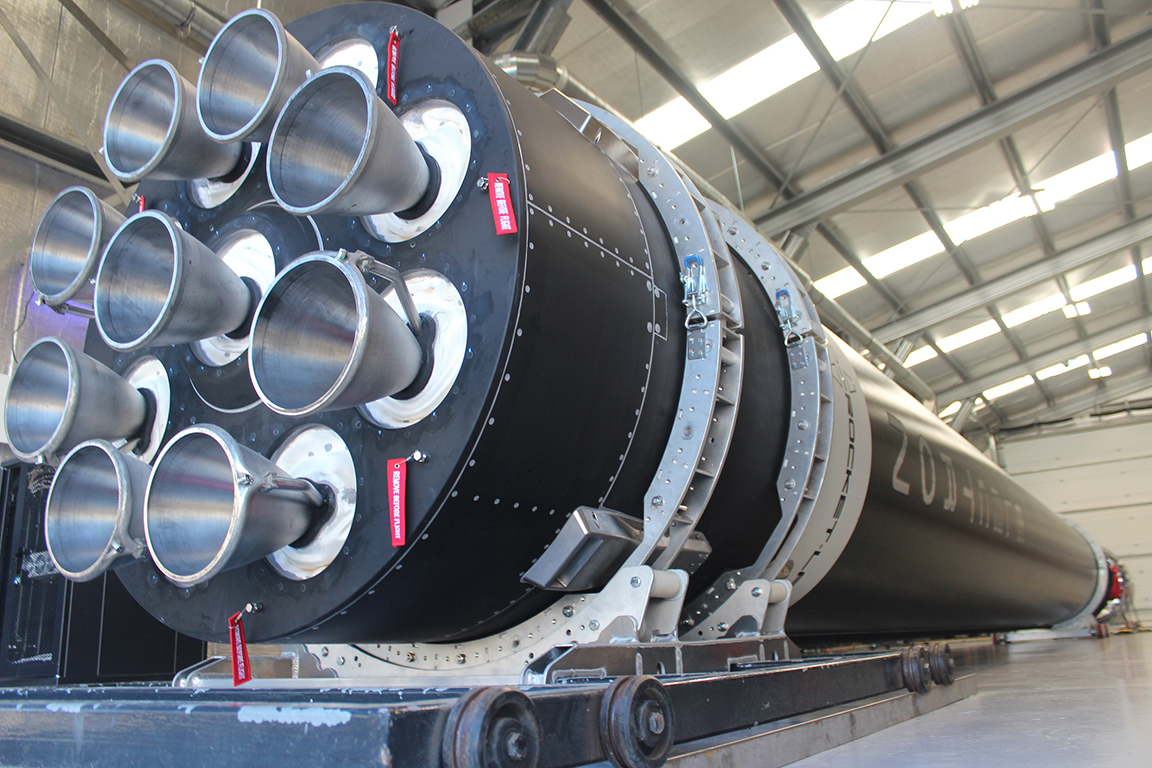
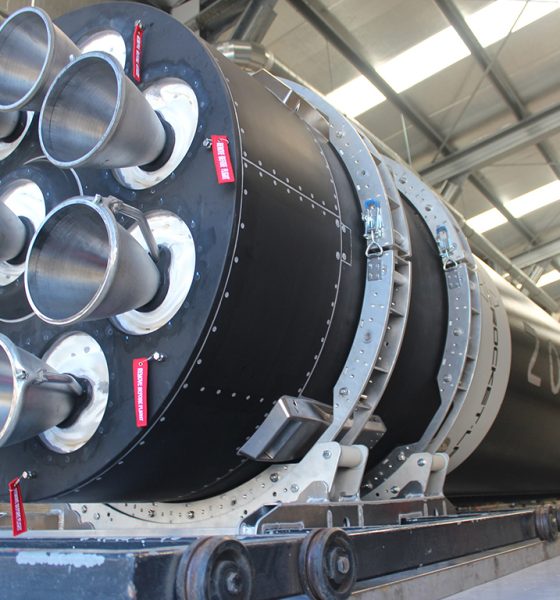
News
Rocket Lab channels SpaceX-like rapid launch capability in July 4 Electron mission
The prominent launcher of dedicated small satellite launches, Rocket Lab, looks to achieve SpaceX-like rapid launch capability of its Electron rocket. The company is targeting its shortest turn around time between missions from the same launch pad. Just three weeks ago, Rocket Lab returned to operational launch status following the easement of Covid-19 restrictions at the company’s Launch Complex 1 in Mahia, New Zealand. The Electron rocket completed its twelfth mission nicknamed “Don’t Stop Me Now” which supported a rideshare payload of five smallsats to orbit. Now, Rocket Lab is ready for its third mission of 2020 – the second in just three weeks – with Electron’s thirteenth mission “Pics Or It Didn’t Happen.”
The launch window for #PicsOrItDidntHappen opens on 3 July UTC. Lift-off will take place from Rocket Lab Launch Complex 1 Pad A on the Mahia Peninsula. pic.twitter.com/01sDCXVj03
— Rocket Lab (@RocketLab) June 15, 2020
Rideshare mission of space cameras
The “Pics Or It Didn’t Happen” mission features a rideshare manifest consisting of seven small satellite payloads for customers Planet, In-Space Missions, and rideshare and mission manager Spaceflight Inc.’s customer Canon Electronics. The majority of payloads are Earth-imaging satellites inspiring the “Pics Or It Didn’t Happen” mission nickname. The primary payload, Canon Electronics Inc.’s CE-SAT-IB microsatellite, will demonstrate the company’s high definition and wide-angle Earth-imaging capabilities and will serve as a testbed for future opportunities of mass production. Also aboard Electron is five of Planet’s latest generation SuperDove (Flock4e) Earth-observation satellites equipped with new sensors to produce higher quality images of Earth’s landmass on a near-daily basis. The UK enterprise In Space Missions provides the final payload with its maiden Faraday-1 6U CubeSat. According to In Space Missions, Faraday-1 is “the first in a series of satellites that will provide a turnkey service for commercial customers and research organizations wanting to access to space at a competitive and affordable cost.” Currently, In Space Missions has four more satellites under contract with the Faraday service.
Rocket Lab’s carbon composite Electron booster propelled by nine 3D-printed Rutherford sea-level engines capable of 36,000lbf (162kN) of thrust will send all payloads to a 500km sun-synchronous low Earth orbit at an inclination of 97.5 degrees.
It's almost time to go to space! Today's mission will see seven small sats launched to a 500 km circular orbit for @SpaceflightInc customer @Canon, as well as small sat operators @planetlabs and @Heads_InSpace. pic.twitter.com/mMKENVBeLa
— Rocket Lab (@RocketLab) July 4, 2020
Rapid launch capability within reach
According to Rocket Lab, a new Electron booster is produced in-house approximately every eighteen days at its production facility in Auckland, New Zeland. While Electron currently only launches from Launch Complex 1 on New Zeland’s Mahia Peninsula, Rocket Lab looks to further open small satellite access to orbit and expand its launching capabilities with two more operational launch complexes targeted to begin service later this year. The Mahia Peninsula location has recently undergone expansion, adding the neighboring Launch Complex 1B while a third launch location, Launch Complex 2, has been opened at the Mid-Atlantic Regional Spaceport in Wallops Island, Virginia.
Lots of launch pads, we got ‘em. Electron is on the pad at LC-1A this week with a front row view of construction progress on LC-1B. pic.twitter.com/ijZAVRc6yV
— Rocket Lab (@RocketLab) July 1, 2020
Rocket Lab Founder and CEO, Peter Beck, states that multiple launch locations “enables our small sat operators to do more, spend less, and get to orbit faster” and that “Rocket Lab has eliminated the small sat waiting room for orbit. We’ve focused heavily on shoring up our rapid launch capability in recent years and we’re proud to be putting that into practice for the small sat community with launches just days apart.”
The rocket backlog. pic.twitter.com/AhHlbNvEmq
— Peter Beck (@Peter_J_Beck) May 15, 2020
With an expansive backlog of Electron boosters, Rutherford engines, and the capability to soon launch missions back-to-back from neighboring launchpads Rocket Lab aims to break into the market of rapid launch capability joining the likes of SpaceX and its Falcon 9 rocket which has launched 91 times (89 times successfully) since 2010. The company also looks to break into the booster recovery market also pioneered by SpaceX.
Earlier this year, Rocket Lab completed a successful mid-air recovery demonstration of a parachute equipped test article with a helicopter and a specially designed grappling hook. Beck recently revealed on Twitter that Rocket Lab is targeting the seventeenth flight of the Electron to debut fully operational recovery efforts of the first stage booster to occur at some point before year’s end.
The “Pics Or It Didn’t Happen” mission previously scheduled for July 3rd, moved to July 5th, then pushed up to July 4th is now targeting liftoff NET 21:19 UTC/5:19 pm EDT from LC-1 in New Zealand taking advantage of more favorable launch weather conditions. Rocket Lab has stated on Twitter, however, that there is a “relatively high chance” of the launch attempt scrubbing to a later date as the possibility of high ground winds still persists. Should they be needed, backup launch opportunities extend through July 16th.
The “Pics Or It Didn’t Happen” Electron and payload are currently vertical at LC-1 ahead of the launch attempt. A Livestream of the effort will be made available approximately fifteen minutes ahead of liftoff posted to the company’s social media accounts and available on the company’s website: www.rocketlabusa.com/live-stream.

News
IM Motors co-CEO apologizes to Tesla China over FUD comments
Liu said later investigations showed the accident was not caused by a brake failure on the Tesla’s part, contrary to his initial comments.
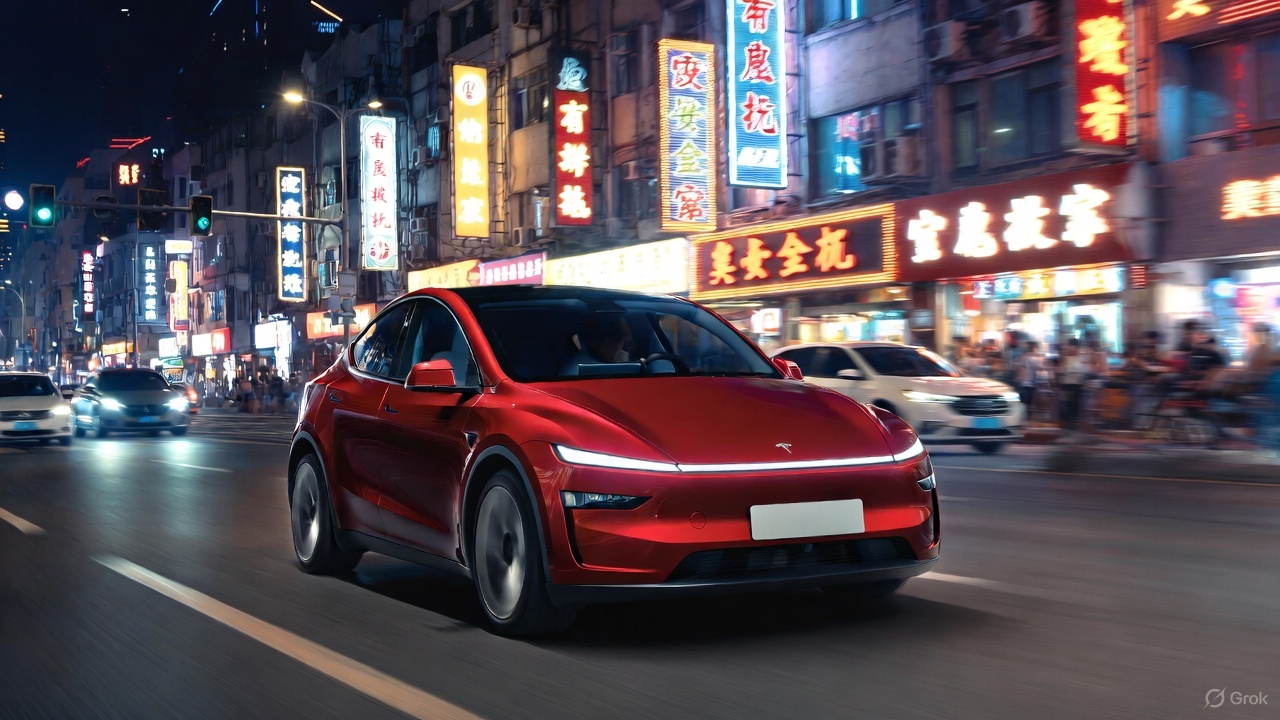
Liu Tao, co-CEO of IM Motors, has publicly apologized to Tesla China for comments he made in 2022 suggesting a Tesla vehicle was defective following a fatal traffic accident in Chaozhou, China.
Liu said later investigations showed the accident was not caused by a brake failure on the Tesla’s part, contrary to his initial comments.
IM Motors co-CEO issues apology
Liu Tao posted a statement addressing remarks he made following a serious traffic accident in Chaozhou, Guangdong province, in November 2022, as noted in a Sina News report. Liu stated that based on limited public information at the time, he published a Weibo post suggesting a safety issue with the Tesla involved in the crash. The executive clarified that his initial comments were incorrect.
“On November 17, 2022, based on limited publicly available information, I posted a Weibo post regarding a major traffic accident that occurred in Chaozhou, suggesting that the Tesla product involved in the accident posed a safety hazard. Four hours later, I deleted the post. In May 2023, according to the traffic police’s accident liability determination and relevant forensic opinions, the Chaozhou accident was not caused by Tesla brake failure.
“The aforementioned findings and opinions regarding the investigation conclusions of the Chaozhou accident corrected the erroneous statements I made in my previous Weibo post, and I hereby clarify and correct them. I apologize for the negative impact my inappropriate remarks made before the facts were ascertained, which caused Tesla,” Liu said.
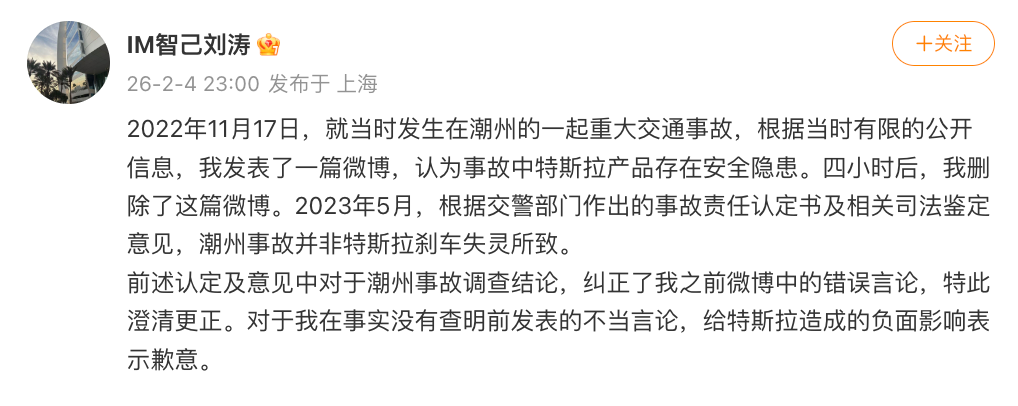
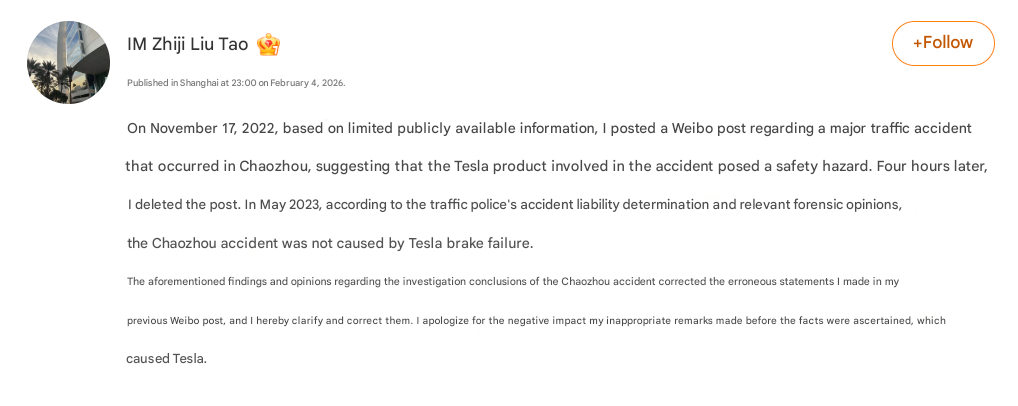
Investigation and court findings
The Chaozhou accident occurred in Raoping County in November 2022 and resulted in two deaths and three injuries. Video footage circulated online at the time showed a Tesla vehicle accelerating at high speed and colliding with multiple motorcycles and bicycles. Reports indicated the vehicle reached a speed of 198 kilometers per hour.
The incident drew widespread attention as the parties involved provided conflicting accounts and investigation details were released gradually. Media reports in early 2023 said investigation results had been completed, though the vehicle owner requested a re-investigation, delaying the issuance of a final liability determination.
The case resurfaced later in 2023 following a defamation lawsuit filed by Tesla China against a media outlet. According to a court judgment cited by Shanghai Securities News, forensic analysis determined that the fatal accident was unrelated to any malfunction on the Tesla’s braking or steering systems. The court also ruled that the media outlet must publish an apology, address the negative impact on Tesla China’s reputation, and pay a penalty of 30,000 yuan.
Elon Musk
SpaceX is exploring a “Starlink Phone” for direct-to-device internet services: report
The update was reportedly shared to Reuters by people familiar with the matter.
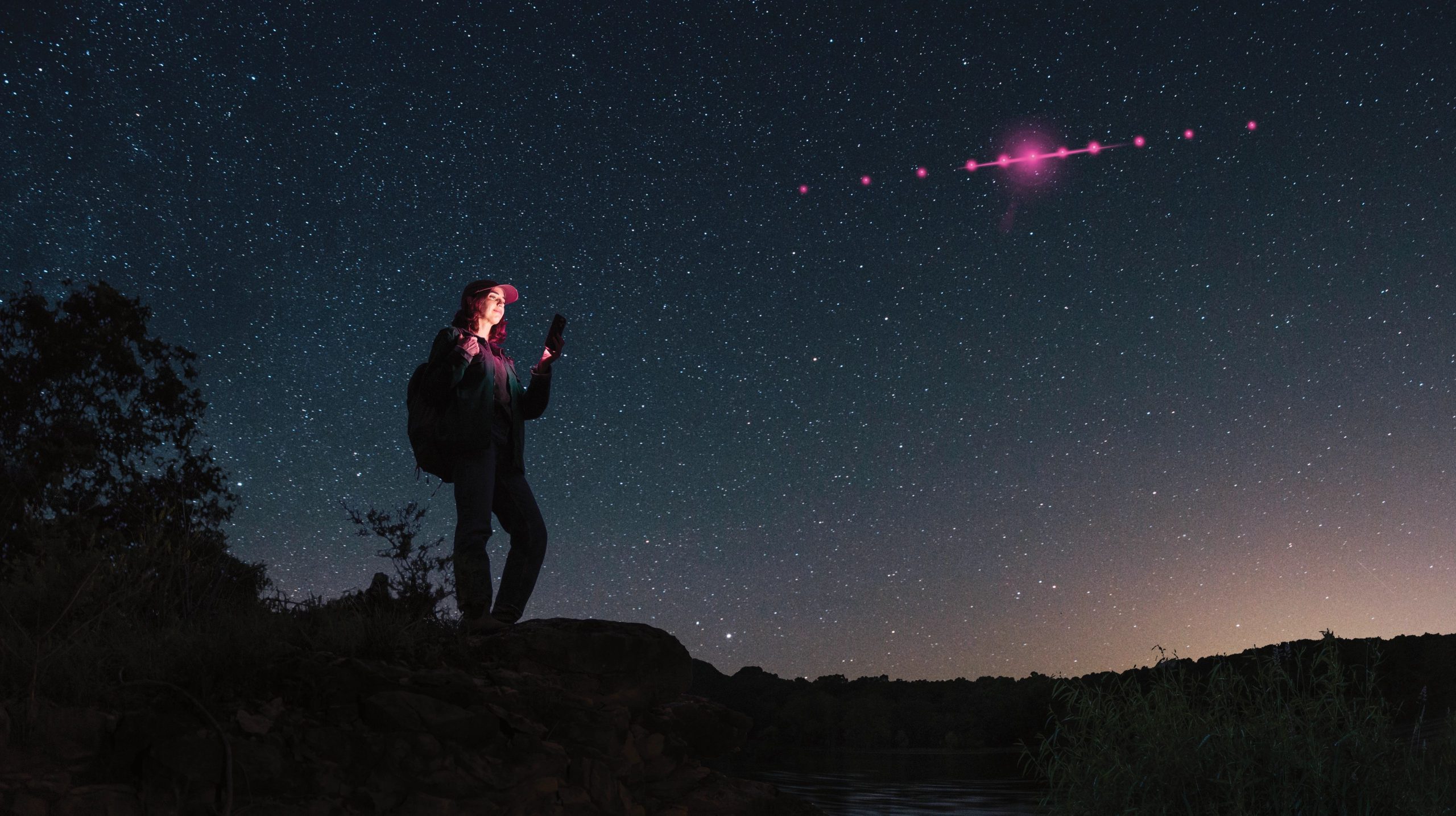
SpaceX is reportedly exploring new products tied to Starlink, including a potential Starlink-branded phone.
The update was reportedly shared to Reuters by people familiar with the matter.
A possible Starlink Phone
As per Reuters’ sources, SpaceX has reportedly discussed building a mobile device designed to connect directly to the Starlink satellite constellation. Details about the potential device and its possible release are still unclear, however.
SpaceX has dabbled with mobile solutions in the past. The company has partnered with T-Mobile to provide Starlink connectivity to existing smartphones. And last year, SpaceX initiated a $19.6 billion purchase of satellite spectrum from EchoStar.
Elon Musk did acknowledge the idea of a potential mobile device recently on X, writing that a Starlink phone is “not out of the question at some point.” Unlike conventional smartphones, however, Musk described a device that is “optimized purely for running max performance/watt neural nets.”
Starlink and SpaceX’s revenue
Starlink has become SpaceX’s dominant commercial business. Reuters’ sources claimed that the private space company generated roughly $15–$16 billion in revenue last year, with about $8 billion in profit. Starlink is estimated to have accounted for 50% to 80% of SpaceX’s total revenue last year.
SpaceX now operates more than 9,500 Starlink satellites and serves over 9 million users worldwide. About 650 satellites are already dedicated to SpaceX’s direct-to-device initiative, which aims to eventually provide full cellular coverage globally.
Future expansion of Starlink’s mobile capabilities depends heavily on Starship, which is designed to launch larger batches of upgraded Starlink satellites. Musk has stated that each Starship launch carrying Starlink satellites could increase network capacity by “more than 20 times.”
Elon Musk
FCC accepts SpaceX filing for 1 million orbital data center plan
The move formally places SpaceX’s “Orbital Data Center” concept into the FCC’s review process.
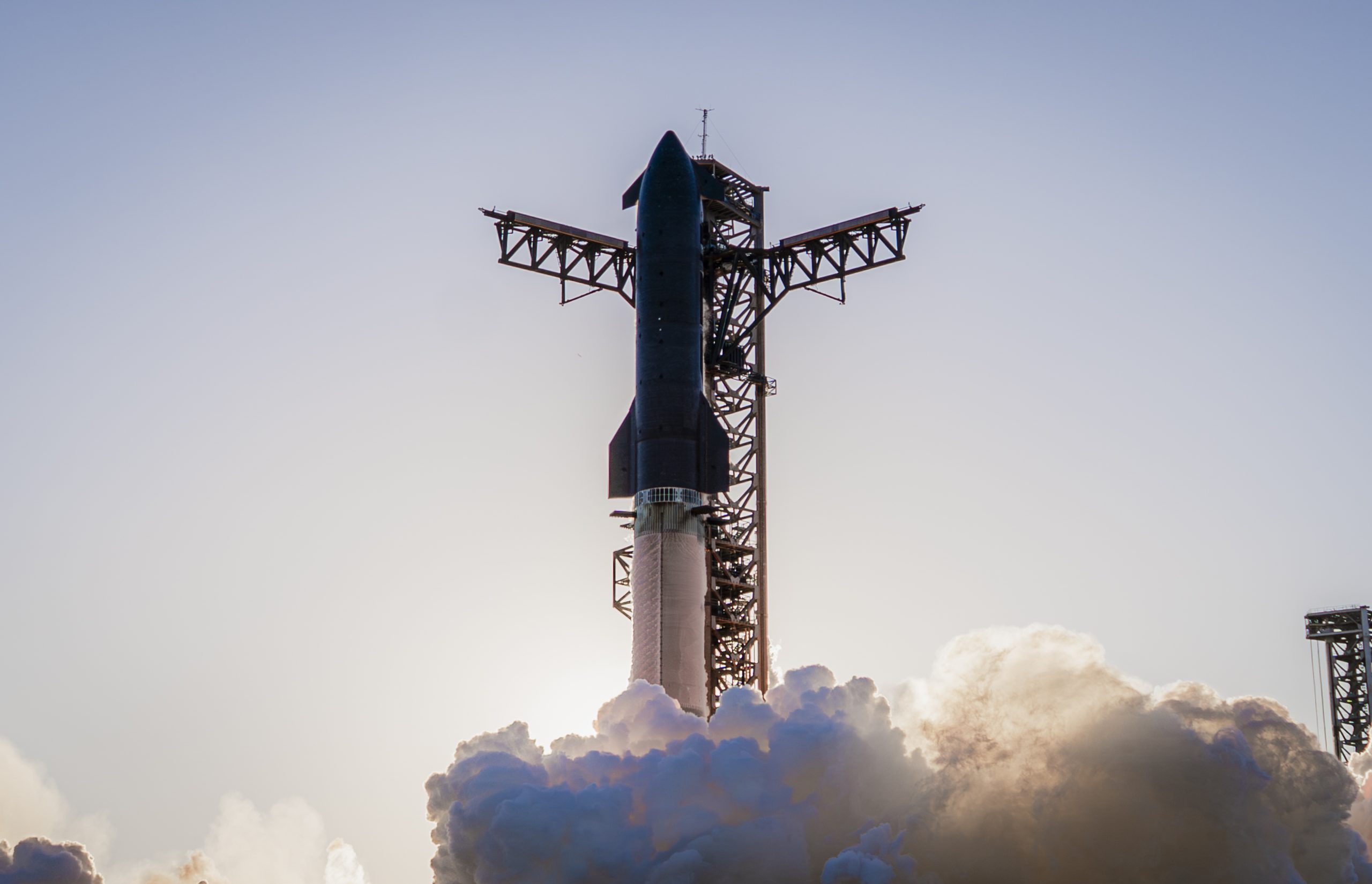
The Federal Communications Commission (FCC) has accepted SpaceX’s filing for a new non-geostationary orbit (NGSO) satellite system of up to one million spacecraft and has opened the proposal for public comment.
The move formally places SpaceX’s “Orbital Data Center” concept into the FCC’s review process, marking the first regulatory step for the ambitious space-based computing network.
FCC opens SpaceX’s proposal for comment
In a public notice, the FCC’s Space Bureau stated that it is accepting SpaceX’s application to deploy a new non-geostationary satellite system known as the “SpaceX Orbital Data Center system.” As per the filing, the system would consist of “up to one million satellites” operating at altitudes between 500 and 2,000 kilometers, using optical inter-satellite links for data transmission.
The FCC notice described the proposal as a long-term effort. SpaceX wrote that the system would represent the “first step towards becoming a Kardashev II-level civilization – one that can harness the Sun’s full power.” The satellites would rely heavily on high-bandwidth optical links and conduct telemetry, tracking, and command operations, with traffic routed through space-based laser networks before being sent to authorized ground stations.
FCC Chairman Brendan Carr highlighted the filing in a post on X, noting that the Commission is now seeking public comment on SpaceX’s proposal. Interested parties have until early March to submit comments.
What SpaceX is proposing to build
As per the FCC’s release, SpaceX’s orbital data center system would operate alongside its existing and planned Starlink constellations. The FCC notice noted that the proposed satellites may connect not only with others in the new system, but also with satellites in SpaceX’s first- and second-generation Starlink networks.
The filing also outlined several waiver requests, including exemptions from certain NGSO milestone and surety bond requirements, as well as flexibility in how orbital planes and communication beams are disclosed, as noted in a Benzinga report. SpaceX noted that these waivers are necessary to support the scale and architecture of the proposed system.
As noted in coverage of the filing, the proposal does not represent an immediate deployment plan, but rather a framework for future space-based computing infrastructure. SpaceX has discussed the idea of moving energy-intensive computing, such as AI workloads, into orbit, where continuous solar power and large physical scale could reduce constraints faced on Earth.








